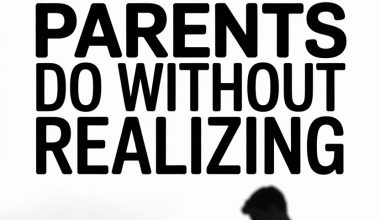Ever found yourself mid-tantrum (your child’s, hopefully) and wondered, “Wait, am I the fun police?”
Parenting with boundaries is essential, but sometimes, without even realising it, the rules and routines pile up like the washing after a rainy week.
While structure and discipline are crucial, there’s a point when “strict” slips quietly into “overbearing.”
Here are nine signs you might be crossing that line—plus what to do about it, starting tonight.
1. Every Conversation Turns Into a Lecture
You ask your child how their day was, and five minutes later, you realise you’re knee-deep in a cautionary tale about internet safety, the dangers of sugar, and whether that friend’s house has a smoke alarm.
If your child’s eyes glaze over faster than a Krispy Kreme, it’s a clue.
Nobody likes feeling like they’re in permanent detention. Consider swapping some lectures for light-hearted chats or genuine questions.
According to parenting expert Dr. Laura Markham, children open up more when they sense genuine curiosity instead of impending judgment. Try, “What was the funniest thing that happened at school?” and see what happens.
2. Your Kids Hide Their Mistakes From You
Found out about a broken vase from your neighbour’s Instagram, not your child? Kids who fear strict consequences often go to great lengths to cover up even minor slip-ups.
Research published by the University of Virginia found that strict parenting increases the likelihood of children lying to avoid punishment.
If your home feels a bit like a secret society (complete with password-protected snack stashes), it’s time for a rethink. Remind your kids (and yourself) that a mistake is a chance to learn, not a call for a sentencing hearing.
3. “Because I Said So” Is Your Go-To Reason
When the family motto starts sounding a little too much like a military command, it might be time for a reassessment.
While the odd “because I said so” can get dinner on the table before bedtime, repeating it like a broken record shuts down any chance of kids understanding your perspective, or developing their own.
Try explaining the why behind your rules. “We eat dinner before dessert because our bodies need fuel, not just sugar,” goes down smoother than “Because I said so” (and sounds a lot less like you’re auditioning for a role as Evil Stepmother).
4. Every Day Is All About Rules and Schedules
Is your family calendar colour-coded? Do your kids know exactly what they’re doing, where, and with whom, every minute of the day?
While routines are lovely (who doesn’t adore a well-timed cuppa?), a relentlessly rigid schedule can turn home into Hogwarts-without-the-magic.
If spontaneous playdates or a lazy afternoon make you twitchy, ask yourself what’s really at stake. Kids learn creativity, flexibility, and decision-making by having freedom to play—sometimes messily, sometimes loudly, always memorably.
As psychologist Dr. Peter Gray points out, unstructured play is crucial for emotional development and resilience.
5. Mistakes Aren’t Allowed
A single B+ on a spelling test and suddenly the Wi-Fi’s off, the iPad’s missing, and you’re reciting the spelling rules for “i before e.”
High standards are fine, but if slip-ups are met with panic or punishment instead of guidance, you’re not fostering excellence—you’re breeding anxiety.
Ask what support your child needs to do better next time, rather than doling out consequences for every misstep. Celebrate effort as much as achievement (even when “effort” looks like a half-baked science project held together with masking tape and hope).
6. Sibling Arguments End With “Because I’m the Parent, That’s Why”
If your approach to sibling squabbles involves laying down the law without hearing both sides, you might be missing out on a golden opportunity to teach conflict resolution.
Yes, sometimes refereeing feels like herding cats, but children learn crucial negotiation and empathy skills from these run-ins.
Instead of delivering a verdict from on high, invite everyone to share their side—without interrupting—then brainstorm solutions together.
It’s not about who’s right; it’s about teaching problem-solving (and giving your referee whistle a well-earned rest).
7. Free Time Doesn’t Really Exist
If every spare minute is filled with lessons, chores, or “enriching” activities, your kids might never get the chance to be bored.
And believe it or not, boredom is brilliant for brain development. Studies, including this one from the University of Central Lancashire, show that free, unstructured time fuels creativity and problem-solving.
Ease up on the schedule. Let your child rummage through the recycling bin for a cardboard sculpture, or simply stare out the window. You might be surprised what they come up with—and how much more relaxed everyone feels.
8. Every Outing Feels Like Boot Camp
Taking the kids to the park? If you find yourself barking orders like a drill sergeant—“Shoes on! Hats! Sunscreen! Don’t touch that! Stay together!”—your well-intentioned caution might be crossing over into control.
Safety matters, no question. Still, children need space to take age-appropriate risks (yes, tree climbing counts), fall down, and get back up.
Next time, choose one or two essential reminders, then let go a little. Trust that scraped knees and muddy trainers are part of a happy childhood—not parenting failures.
9. Laughter Is a Rare Guest
Can you recall the last time you and your kids laughed so hard you almost cried? If your home has the energy of a particularly stern library, it might be time to loosen up.
Strictness without warmth leads to resentment and rebellion (and, let’s be honest, some very creative rule-breaking).
Try a silly game at dinner. Watch a daft movie together. Swap “Goodnight” for your best pirate impression at bedtime.
The world is a serious enough place as it is; your home can be a haven for joy and giggles.
Room to Breathe
Raising kids is never simple. Some days, the lines blur between protecting, guiding, and stifling. Every parent finds themselves teetering on the edge of “too strict” now and then.
The good news? Every day brings a fresh chance to reset the balance.
If you recognised yourself in more than a couple of these signs, congratulations: you care deeply about your child’s well-being.
A little more flexibility, a bit more laughter, and a healthy dose of self-compassion can work wonders.
And if all else fails, nothing breaks tension like a family dance party in the kitchen.
Just ask your kids—after all, they’re the real experts in fun.




